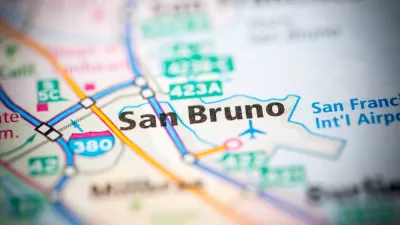Cultural changes and 'disruptions' created by the 'sharing' economy are challenging planners just as they're challenging their own competitors. Bill Fulton assesses the brave new world that might liberate planners—or befuddle them.
"Planners, for the most part, write and implement regulations that seek to plan for and control land uses. They do so for a variety of well-established reasons – ensuring that public health and safety are protected, but also helping to stimulate, shape, and channel the supply of built space so that the interests of a given community are balanced against the demands of the marketplace."
"But how can you possibly plan for and control land uses when every bedroom is a hotel room, and every dining room is a restaurant, and every coffee shop is an office, and conversely every office is a potential living room or dining room or bedroom?"
"The needs for parks, libraries, schools, and lots of other public facilities is all based on formulas tied to land uses. Residential densities determine the number of housing units (based on formulas tied to land use), which in turn determines the need for all these facilities (based on formulas that assume household size and composition), which in turn determines the need for both public investment and impact fees."
"In a certain way, this is pretty liberating for planners – kind of an extension of the form-based code movement, which focuses more on urban design than on the specific uses contained within buildings. Instead of micro-managing private development through regulation, California’s planners could rediscover the kind of planning that originated with Daniel Burnham and the Olmsteads: Focusing on created a beautiful and well-functioning public realm, around which the developers can build private projects that respond to the market."
FULL STORY: The Tech Housing Crunch’s Fracking Dilemma

Maui's Vacation Rental Debate Turns Ugly
Verbal attacks, misinformation campaigns and fistfights plague a high-stakes debate to convert thousands of vacation rentals into long-term housing.

Planetizen Federal Action Tracker
A weekly monitor of how Trump’s orders and actions are impacting planners and planning in America.

San Francisco Suspends Traffic Calming Amidst Record Deaths
Citing “a challenging fiscal landscape,” the city will cease the program on the heels of 42 traffic deaths, including 24 pedestrians.

Defunct Pittsburgh Power Plant to Become Residential Tower
A decommissioned steam heat plant will be redeveloped into almost 100 affordable housing units.

Trump Prompts Restructuring of Transportation Research Board in “Unprecedented Overreach”
The TRB has eliminated more than half of its committees including those focused on climate, equity, and cities.

Amtrak Rolls Out New Orleans to Alabama “Mardi Gras” Train
The new service will operate morning and evening departures between Mobile and New Orleans.
Urban Design for Planners 1: Software Tools
This six-course series explores essential urban design concepts using open source software and equips planners with the tools they need to participate fully in the urban design process.
Planning for Universal Design
Learn the tools for implementing Universal Design in planning regulations.
Heyer Gruel & Associates PA
JM Goldson LLC
Custer County Colorado
City of Camden Redevelopment Agency
City of Astoria
Transportation Research & Education Center (TREC) at Portland State University
Jefferson Parish Government
Camden Redevelopment Agency
City of Claremont





























